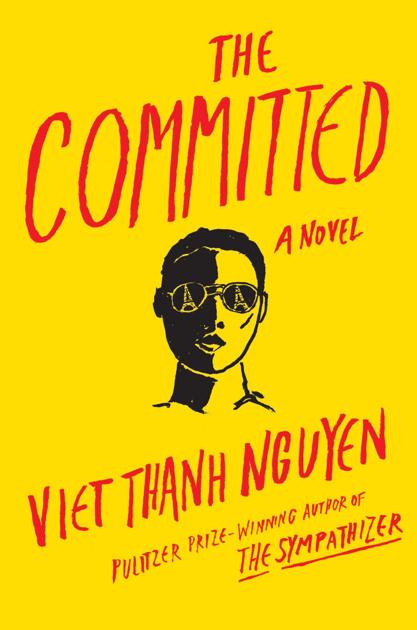
THE COMMITTED. By Viet Thanh Nguyen. Grove Press. 341 pages. $27.
About a third of the way through Viet Thanh Nguyen’s new novel, "The Committed," the narrator finds himself in a waiting room. He is a Vietnamese refugee making his way in Paris, and he has been led to a series of business connections on the city’s underside. In the waiting room, he sits with a large African, who serves as a bouncer. Together they watch a television program about existentialism.
The African bouncer offers a critique of the great French existentialist Jean Paul Sartre, and suggests that he prefers the anti-colonial writers Aimé Césaire and Frantz Fanon. Afterwards, the two men compare the merits of Fanon’s "The Wretched of the Earth" and "Black Skin, White Masks," discussing which one might be more helpful in the struggle against imperialism. The conversation is as intelligent as it is brief, the scene quickly shifting as the door to the waiting room opens and the narrator passes through it into a much more uncomfortable situation.
Reading "The Committed" is not unlike finding oneself in a similar waiting room. The novel, as a whole, moves very quickly through a series of increasingly outrageous scenes. Yet it pauses again and again to ask the deepest philosophical questions. As such, Nguyen has given us a book of ideas in the guise of fiction. He has created the characters, but their dialogue includes some of the most important thinkers and ideas in memory. Not only do Sartre, Césaire and Fanon feature prominently, but so do Hegel, Marx, de Beauvoir, Camus and a chorus of others.
In Nguyen’s hands, however, the philosophy is never dry because his characters are busy living it out in a series of increasingly absurd scenarios.
"The Committed" is a sequel to Nguyen’s book, "The Sympathizer," which won the 2016 Pulitzer Prize for Fiction, though he has written the new volume in such a way that readers may easily pick it up on its own. Those who read "The Sympathizer" will recognize its recurring characters, particularly the narrator, who has a talent for seeing almost any issue from both sides.
Whereas much of "The Sympathizer" was set in the United States, allowing the narrator to critique American society and culture, "The Committed" is set in Paris, where he is able to view the French through a similarly skeptical lens. In both countries, the narrator experiences the harms of racism, colonialism and capitalism, though they are expressed differently through the cultural lenses of American exceptionalism and French imperialism. In any case, the experience of the narrator remains that of a refugee, an immigrant, an unwanted foreigner in lands to which he does and does not really belong.
Here we come to Nguyen’s great strengths as a writer and teacher. In essays and interviews he has spoken of his own story as a refugee, a Vietnamese American who felt like a spy growing up in San Jose, Calif. In his Vietnamese home, he felt American. In his American city, he felt Vietnamese. Perhaps it is little wonder, then, that he would grow up to write a character who could see both sides while always questioning whether he was fully aligned with either.
"The Sympathizer" was such a forceful book because it possessed a conflicted consciousness. "The Committed" deepens the search by bringing so many more voices into a vital conversation about the most important questions of all: Who do we think we are? What is to be done? To what, or whom, are we committed?
Albert Camus once spoke of the role of the artist as that of learning to “create dangerously.” Neutrality or the silence that sided with the status quo were no longer options for writers, who must accept the risk of speaking out. James Baldwin echoed the sentiment when he said that artists must tell as much of the truth as they can bear, and then a little more. Toni Morrison explained that when she wrote, she didn’t translate herself, but wrote freely, in her own voice, without fear of what others would think or concern for what they wanted her to say.
After "The Sympathizer" and "The Committed," it is clear that Nguyen is a writer in their lineage, which is to say a writer of conscience. What burns through the pages of the novel are questions of conscience that won’t let the reader go.
This is not to say that "The Committed" isn’t a roller coaster ride of unbelievable scenes; it is. Oftentimes while reading, I found myself cringing, tensing, then gasping and laughing out loud. Nguyen’s work is not for the faint of heart or those without a sense of the absurd. Yet its primary audience may be all of us who long for a deeper conversation, a bolder critique and more radical forms of truth telling.
It should not be lost on any of us that at this moment in our history, with anti-Asian hate in the American air and splashed across the front page, one of the most powerful voices in fiction is that of a Vietnamese American, who is able to see more than both sides of an issue; he is able to see our country as it truly is. This reviewer is grateful that he is willing to tell us.
"Review" - Google News
April 25, 2021 at 06:00PM
https://ift.tt/3eq2l3w
Review: 'The Committed' a roller coaster ride of big ideas in the guise of fiction - Charleston Post Courier
"Review" - Google News
https://ift.tt/2YqLwiz
https://ift.tt/3c9nRHD
Bagikan Berita Ini














0 Response to "Review: 'The Committed' a roller coaster ride of big ideas in the guise of fiction - Charleston Post Courier"
Post a Comment